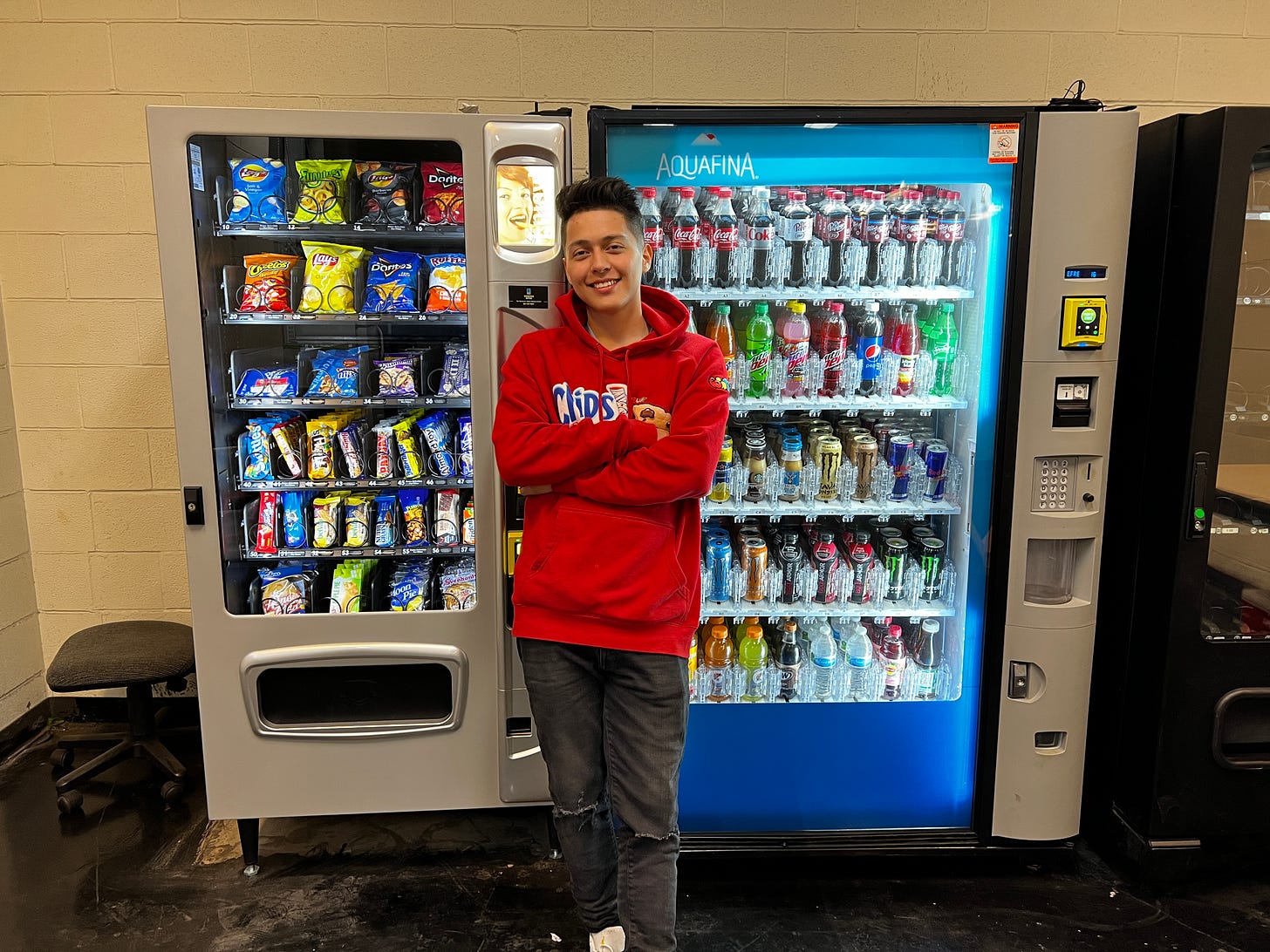- Lemonade Stand Finance
- Posts
- Financial News of the Day: From Vending Machines to Bitcoin
Financial News of the Day: From Vending Machines to Bitcoin
Exploring Dynamic Pricing in Dining, Vending Machines as a Business, and Wall Street's Crypto Shift

Article 1: "Chasing Passive Income: Americans Turn to Vending Machines" – Originally Reported by The Wall Street Journal

Americans are now eyeing vending machines, not just for a quick snack fix, but as a legit investment path to passive income. Jaime Ibanez, a YouTuber from Texas, flaunts his vending machine biz that rakes in hundreds monthly. It's a trend catching fire as folks seek side hustles to beef up their earnings, with some envisioning a future free from the 9-to-5 hustle, captaining their own fleet of snack-dispensing ships.
Starting up is pretty doable – snag a secondhand machine, stock it with goodies, and voila, you're in business. But it’s not just a walk in the park; location and foot traffic are make-or-break factors. The U.S. hosts a hefty 3 million vending machines, stirring up a $18.2 billion industry – but not everyone’s cashing in big time.
Social media's buzz around vending machines and passive income is spiking, suggesting this old-school investment might be the new kid on the block again. Yet, as some entrepreneurs expand their empire, others learn the hard way that it’s not just about the machine but also the strategy.
Key Takeaways & Actionable Insights:
Low Barrier to Entry: With a modest startup cost, vending machines present a viable side hustle option.
Location is King: Profitability hinges on placing machines where they'll see plenty of action.
Patience and Strategy: Success requires diligent restocking, smart product choices, and a dash of patience as you learn the ropes.
Educate Yourself: Lean on free resources like YouTube and Reddit before considering paid courses.
Monitor and Adapt: Keep tabs on your inventory and sales to know what's hot and what's not, and be ready to pivot if something isn't selling.
Whether you dream of a vending machine empire or just some extra dough, it's clear this isn't a set-it-and-forget-it gig. But with some savvy moves and a sprinkle of entrepreneurial spirit, vending machines could be your ticket to passive income.
Jargon Used in Article:
Passive Income: Earning money without actively working for it all the time.
Side Hustle: An extra job or way to make money besides your main job.
Foot Traffic: How many people walk past a certain location.
Inventory: The items you have available to sell.
Profitability: How much money you make after paying all your costs.
Article 2: "Surge Pricing Is Coming to More Menus Near You – Originally Reported by The Wall Street Journal"

Restaurants are catching up with the likes of airlines and hotels, experimenting with dynamic pricing, a.k.a. surge pricing, for their menus. Places like Cali BBQ in San Diego are using tech to vary the cost of their dishes based on demand, potentially boosting sales but also risking the ire of customers already weary from inflation. For example, a pulled-pork sandwich at Cali BBQ could swing from $18 on a busy Saturday night to around $12 on a quieter weekday afternoon.
Wendy’s dipped its toe in these waters too, planning to test dynamic pricing via digital menus that might offer discounts during slower hours, though they backtracked on peak-time price hikes due to customer pushback. Some restaurants, like Bartaco, are already seeing a revenue uptick from varying prices on app orders, while historic spots like Gene and Georgetti in Chicago are charging extra for prime seats at peak times.
Despite its potential, not every chain is on board, fearing it might further annoy customers. Dynamic pricing is a double-edged sword, offering a chance to boost sales while testing consumer loyalty.
Key Takeaways & Actionable Insights:
Dynamic Pricing in Restaurants: More eateries are experimenting with dynamic pricing, adjusting food costs based on demand and time, similar to pricing strategies used in airlines and hotels.
Consumer Reaction is Mixed: While dynamic pricing can boost revenue for restaurants, it also risks alienating customers, especially in a time of high inflation.
Technology's Role: Advances in technology are making it easier for restaurants to implement dynamic pricing, with digital menus and apps enabling real-time price adjustments.
Feedback Matters: Witness how consumer reactions can influence business decisions, as seen with Wendy’s rethinking its dynamic pricing strategy. This highlights the power of consumer voice and preferences in shaping market practices.
Jargon Used in Article:
Dynamic Pricing: Adjusting prices based on demand and time, like charging more during busy hours.
Surge Pricing: A form of dynamic pricing where prices go up during periods of high demand.
Inflation: The general increase in prices over time, which can lead to your money buying less.
Article 3: "How Bitcoin Made a Believer Out of BlackRock – Originally Reported by The Wall Street Journal"

Larry Fink, CEO of BlackRock, has made a notable U-turn on bitcoin, signalling a larger shift in Wall Street's approach to cryptocurrencies. Once a skeptic, Fink now leads a firm that manages a rapidly growing bitcoin fund and partners with key players in the digital-assets industry. This change reflects the broader Wall Street interest in capitalizing on what was once viewed as the finance world's Wild West.
BlackRock's foray into bitcoin, especially through a low-cost exchange-traded fund, has opened the door for mainstream investors to engage with bitcoin easily, akin to trading stocks. The firm's move also contributes to bitcoin’s legitimacy and its current resilience in the market, with prices surging back to record levels after a series of dramatic crashes.
Critics, however, view this pivot as a fee-driven venture, highlighting the irony in a decentralized asset being promoted by a major Wall Street entity. Despite skepticism, BlackRock's influence in the market is undeniable, as evidenced by the success of its bitcoin ETF, which has drawn more than $10 billion in assets.
BlackRock's stance contrasts sharply with its biggest rival, Vanguard, which remains skeptical about offering crypto-related products. This divergence points to varying strategies and outlooks on cryptocurrencies within the finance industry.
Key Takeaways & Actionable Insights:
Embrace Change in Finance: As major players like BlackRock pivot towards cryptocurrencies, it's crucial for investors and industry watchers to stay adaptable and informed about these shifts in financial trends.
Understand Market Influence: Recognize how influential firms can significantly impact market dynamics, especially in emerging fields like cryptocurrency. This can guide investment strategies and market analysis.
Diverse Investment Strategies: Note the contrasting approaches of major asset managers towards cryptocurrencies. For investors, this highlights the importance of evaluating different perspectives and strategies before making investment decisions.
Research Before Investing: With cryptocurrencies becoming more mainstream, it’s vital for potential investors to thoroughly research and understand these digital assets, including their volatility and market impact.
Monitor Regulatory Developments: Keep an eye on how regulations evolve around cryptocurrencies, as this can significantly affect their market behaviour and investment viability.
Jargon Used in Article:
Bitcoin Fund: An investment fund that primarily holds and manages bitcoin as an asset.
Exchange-Traded Fund (ETF): A type of investment fund that can be traded on stock exchanges, similar to stocks.
Digital Assets: Digital representations of value, like cryptocurrencies, that can be stored or traded electronically.